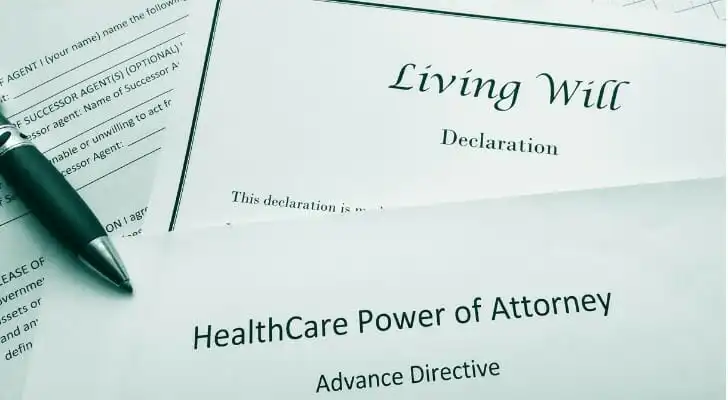 Hard choices wait around every corner as you age, but some of the most difficult ones are about your own care. Without a plan in place, you might not be able to convey your wishes to those around you, leaving loved ones scrambling to make the right decision. Fortunately, there are several ways you can ensure your choices for your medical and end-of-life care are understood. A living will and power of attorney are two of these ways. But what’s the difference between them and how do you know which one is right for you? If you’re beginning to plan your future care, here are the key differences between a living will vs. a power of attorney.
Hard choices wait around every corner as you age, but some of the most difficult ones are about your own care. Without a plan in place, you might not be able to convey your wishes to those around you, leaving loved ones scrambling to make the right decision. Fortunately, there are several ways you can ensure your choices for your medical and end-of-life care are understood. A living will and power of attorney are two of these ways. But what’s the difference between them and how do you know which one is right for you? If you’re beginning to plan your future care, here are the key differences between a living will vs. a power of attorney.
End-of-life planning includes properly arranging your financial affairs, which is where a financial advisor can be immensely helpful.
What Is a Living Will?
Living wills have several names, such as healthcare directives, instruction directives and declarations. So, you may see it under various titles, but its purpose remains the same. A living will is typically a written statement that ensures any medical or healthcare-related decisions you’ve made are carried out. It only comes into play when or if you can’t advocate for yourself or vocalize those wishes.
For example, you may suffer physical trauma or have a degenerative disease like Alzheimer’s. Both of these situations can lead to lost brain activity and incapacitation. So, you’ll need something in place beforehand that protects your choices regarding long-term or end-of-life medical care. Your living will might cover some decisions, including resuscitation, feeding tubes, assisted breathing and other life-prolonging measures. It may also be possible to put in instructions based on your religious or philosophical beliefs.
Since a living will only comes into play while you’re alive (but incapacitated), it ends when you die.
What Is a Power of Attorney?
Like a living will, a power of attorney (POA) is another important document that protects your interests when you cannot. However, it uses a different method to accomplish that. A power of attorney authorizes a trusted individual that you (the principal or grantor) have chosen to make decisions on your behalf. Although you may also see them with titles like proxy, surrogate and attorney-in-fact, this person is often called the agent.
Essentially, a power of attorney does not include a written guide on your preferred care but picks someone to make those choices when they arise. However, unlike a living will, a POA comes in more than one form.
Other Types of Powers of Attorney

A general power of attorney can have a broad range of power depending on your needs. For example, if you leave the country for an extended period, but you have business ventures or investments to take care of, you might give someone power of attorney over them. Specific situations might call for a specialized version of the document. You can alter when the document takes effect if you make it a durable or springing power of attorney.
A durable POA activates the minute you sign the document. After that, the agent assumes his or her position and retains it, even if you become incapacitated, until your death. In contrast, a springing POA only takes effect after you can longer advocate for yourself.
On top of activation, you can also shift the intent by drafting a power of attorney in financial situations or a power of attorney for healthcare. Either way, the agent makes decisions on your behalf. A financially focused POA can allow someone to pay bills, operate your business or even move assets, but they always have to act in your best interest.
Naturally, a POA for healthcare handles your medical care. Their duties can include accessing medical records, deciding course of care and dealing with the employment of your doctor or medical care professionals. If you are considering a power of attorney for healthcare, it might be worthwhile to pursue a financial one as well. That way, your executor can access capital and use it to improve your quality of life.
It’s important to note that you can revoke your POA at any point; you just have to inform your attorney-in-fact and address the document. You may have to amend it or destroy it altogether, depending on your plans.
Living Will vs. Power of Attorney: Which One Do You Need?
A living will preserves your wishes in writing, while a POA empowers a person to make those decisions. Which one you need depends on your situation.
Keep in mind that each state has different rules regarding estate planning. You may find that you live in a state like Pennsylvania, which uses a document known as an advance healthcare directive. This document combines a living will and durable power of attorney for healthcare, negating the need to choose between the two. It’s also possible to determine your state’s specific requirements to make your living will or power of attorney valid.
It can be challenging to navigate this alone, so speak to an estate planner who can help you ensure your documents are legitimate. They can create a custom directive suited to your needs, which will help you avoid these issues from the get-go.
How to Choose an Agent
Generally, people choose their spouse, a trusted friend or a knowledgeable family member to act as their agent. However, you want to make sure this individual will do right by you and can handle difficult decisions. End-of-life care is an emotional topic for family members, and it can stir disagreement. So, choose an agent who will ensure your wishes are kept even amidst arguments.
Speak with your chosen executor early on. Talk with him or her about your wishes before and even after you put them into writing. The person should also receive a copy of your power of attorney once it’s written and know the location you keep yours in, which should be a secure location like a safety deposit box. You may want to consider bringing a copy to your physician and other family members, like a spouse, as well.
The Takeaway
 Planning for the end of your life is a personal process and emotionally taxing. A living will and power of attorney can make it easier for you and your loved ones by handling the hard decisions beforehand. The safest route is to have plans in place to rely on for any situation. Since you can’t predict every scenario in a living will, a power of attorney can help close any gaps. So, your agent can have the living will to rely on and refer back to when they need to make real-time decisions. However, you might not need to pursue two separate documents depending upon your state.
Planning for the end of your life is a personal process and emotionally taxing. A living will and power of attorney can make it easier for you and your loved ones by handling the hard decisions beforehand. The safest route is to have plans in place to rely on for any situation. Since you can’t predict every scenario in a living will, a power of attorney can help close any gaps. So, your agent can have the living will to rely on and refer back to when they need to make real-time decisions. However, you might not need to pursue two separate documents depending upon your state.
If you are looking into a living will, power of attorney or both, research the requirements and reach out to an estate planning attorney. They can help you create a customized document suited to your medical care needs. That way, you and your loved ones can rest easy knowing that everything will be taken care of as you age.
Estate Planning Tips
- Even though you may not need a power of attorney now, don’t wait to make a financial plan. That’s where a financial advisor can offer expert advice. Finding an experienced financial advisor doesn’t have to be hard. SmartAsset’s matching service can connecct you to several advisors in your area in minutes. If you’re ready, get started now.
- If you take the path of a power of attorney, your agent might have to make financial decisions for you. That includes choices for your retirement accounts and 401(k). Use our free 401(k) calculator to estimate how much money your account will have by the time you retire.
Photo credit: ©iStock.com/zimmytws, ©iStock.com/AndreaObzerova, ©iStock.com/Chawich Udomsatapol